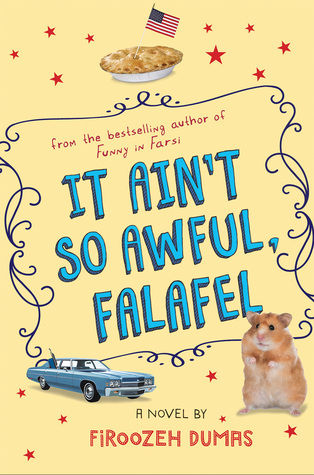 Dumas, Firoozeh. It Ain't So Awful, Falafel
Dumas, Firoozeh. It Ain't So Awful, FalafelMay 3rd 2016 by Clarion Books
ARC from Baker and Taylor
Zomorod's family has been in the US for a while, since her father's job as a petroleum engineer has taken them out of their native Iran in the late 1970s. When they move from Compton to the more well-to-do Newport Beach, she decides to reinvent herself as "Cindy" and try to be more "American". This is hard, especially since her mother doesn't speak much English and insists on giving their new neighbors Iranian food that isn't quite what the US palate expects. She has a good summer hanging out with a neighbor, Original Cindy, but when school starts, Original Cindy says that she can't be seen with her in public. Luckily, Cindy meets Carolyn, who is super nice and shares many of the same interests. Carolyn's family is everything that Cindy wishes hers was, and spends a lot of time hanging out at her house. When the political situation in Iran becomes tense, Cindy is often asked to tell about her country, but when hostages are taken, some people at school give her a hard time, and a few nasty things happen at her home, too, although she and her father hide this from her mother. Her father loses his job with the American company and can't find another one because of the political tensions, so even though they don't want to return to the political unrest in Iran, they start the process of moving back. Luckily, they get help from some unexpected sources and are able to stay in the US.
This is loosely based on Dumas' own life, and we must be exactly the same age, since I was in middle school when the Iranian hostage situation was going on. I, too, remember watching the nightly news and hearing about how many days the people had been in captivity, and remember how it affected the election that year. Cindy is often asked by Cindy's family to explain what is going on in Iran, and while the sections describing the history verge on the didactic, they were also very interesting, and a great overview of the events of the time. Other details about the 1970s, like the clothing and trends, make this a great choice for an entertaining historical read.
This will be interesting also to students who are curious about the immigrant experience as well. Cindy loves her parents, but is embarrassed by their accents and their behavior. She is also tired of translating for her mother, and wishes that her mother didn't cry all the time. The neighbors, teachers, and students are all understanding and supportive of Cindy, and there is even a mention of a teacher who brought Cindy a Halloween costume in elementary school because her family didn't understand the tradition, something which happened in the author's own life. This is a great example of those of us whose ancestors were not recent immigrants.
It's hard enough to fit in with the crowd during middle school when your parents are from the US, and middle school readers love stories about how difficult this process is. Adding an immigrant perspective is a great way to broaden their outlook and make them more compassionate to their classmates. Hand this fun book to readers who enjoyed Budhos' Tell Us We're Home, Ross' Kiki and Jacques, Senzai's Saving Kabul Corner or even Traci Jones' Finding My Place and tell them to see if their parents have the Saturday Night Fever soundtrack to play while they are reading it!

























I'm excited about this one; we have it in processing, and can't wait to read it!
ReplyDelete